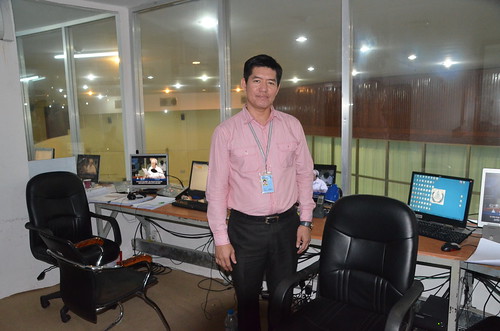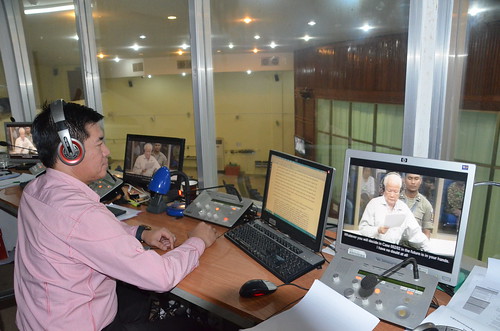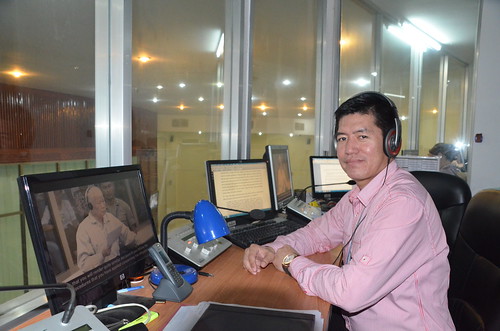The Meet the Court initiative of the Public Affairs Section is an attempt to give more insight to the inner workings of the ECCC, by interviewing some of the staff members working behind the scenes.
We invite you to meet them.
Conference interpreter Mr. Bunleng Cheung certainly knows what true behind-the-scenes work means. Usually hidden inside the courtroom's interpretation booths, Bunleng utilizes his incredible ability to simultaneously interpret the proceedings from Khmer to English (and vice-versa) in a high-speed and precise manner.
Conference interpreters work behind the scene. We are the unseen faces.I find it satisfying when I know that people who come from different parts of the world can understand what is being said in a completely different and unfamiliar language. - Mr. Bunleng Cheung
Get to know the story behind one of the most helpful voices here at ECCC.
***
1. What is your academic and professional background? How did you enter the conference interpretation field and for how long have you been interpreting?
Currently I’m a Ph.D. student in Law at the Asian Europe University (AEU) in Phnom Penh. I obtained my Masters Degree in Law in 2010. While I was in Australia, I sat for exams and received my NAATI Certificate of Accreditation as a translator (formerly known as Level 3) in the English and Khmer languages in 2004 and NAATI Certificate of Accreditation as an interpreter (formerly known as Level 3) also in the English and Khmer languages in 1998. I obtained my Masters of Arts in TESOL (Teaching English to Speakers of Other Languages) at University of Canberra – Canberra, Australia in 1996 and before that I graduated from the University of Phnom Penh in 1994 with the award of Bachelor of Education (TEFL). While working as interpreter for UNTAC, I participated in the Intensive Interpreter Training Course at the Australian Centre for English in Phnom Penh, Cambodia in 1993.
I started working as an interpreter for the first time for Medicins Sans Frontieres while I was still studying at the University of Phnom Penh in 1992. Later, I worked for UNTAC as an interpreter and later senior interpreter until I went for my postgraduate study in Canberra, Australia.
My real job as a conference interpreter started in Melbourne after I obtained my certificates in Translation and Interpretation from NAATI as a professional interpreter and translator. I provided my interpretation service to the Melbourne County Court where there were criminal proceedings against three Accused who were Cambodians/Australians. The trial lasted for six weeks.
2. What exactly is conference interpreting and how is this field different from translating?
Simultaneous interpretation happens at the same time; consecutive interpretation happens a little afterwards.
Simultaneous interpretation involves instant understanding but you don’t have to memorize … or at least as much. Consecutive interpretation involves remembering exactly what the speaker said but you have time to understand it. So the intellectual challenge is different, yet it is just as demanding.
Translation, however, is a completely different art form. Translation means rewriting in the target language, so it is a real literary exercise in which the subtleties are infinite and need to be rendered. Interpretation means “re-speaking” in the target language, so it is an exercise in immediacy in which what matters is clarity, perhaps more than subtlety.
Another point worth noting is that whereas translators are very fussy about absolute semantic equivalence between source language and target language texts, interpreters can paraphrase, bypass absolute semantic equivalence and focus only on general meaning especially when they are grappling with the problem of high speed delivery in the source language. Then absolute semantic equivalence becomes a luxury they cannot afford, since any obsession with absolute semantic equivalence can lead to the dreaded problem of omissions of whole chunks of the speech at hand, amongst other problems.
3. How do you prepare for the hearings ahead?
I and my fellow interpreters arrive in the booth 15 minutes before the start of the hearings (around 8:45 am). This gives us enough time to pull up the key documents of the day on the computer as well as the ECCC’s documentary database in Zylab, since parties also tend to refer to documents that are not necessarily among those scheduled for the day. Hearings officially begin at 9:00 am.
We work in pairs. One interpreter is on the mic for 30 minutes while the other listens and assists by pulling up the target language version of the documents where there are quoted segments and/or by sometimes…. in a very discrete way, of course… slipping on a sheet of paper the magic word the interpreter on the mic might have forgotten in the heat of the action.
It’s somewhat like pilot and co-pilot, except that both switch every half hour.
We get our much appreciated first 20-minute coffee break at around 10:20 am. Then we break for lunch from 11:30 am to 1:30 pm. We then have another 20-minute coffee break at around 2:45 pm and by 4:10 pm we are done for the day.
Besides the typical work routine I mentioned above, I also review transcripts of previous hearings to spot errors I made and try to correct them should the subsequent hearings pose the same or similar problems, I read reference documents, and last but not the least, I have deliberate practice sessions and prepare glossaries for very important and difficult hearings.
4. Your job can be very demanding and stressful at times. What work-related challenges do you usually encounter and how do you deal with them?
The most challenging aspect of this job is dealing with speakers who are not organized in their thinking. One of the secrets of simultaneous interpretation is anticipation. If a speaker’s thoughts are clearly orchestrated, then I can more or less anticipate what the speaker is going to say so I will not fall behind.
I deal with “disorganized” speakers by stepping back and waiting until what the speaker is saying begins to make sense. I am not afraid of the few moments of silence involved in this lag, which often seems like an eternity, and of possibly forgetting what the speaker is saying while I am waiting.
Other key challenges I find are high-speed delivery and high-flown idiomatic language and expressions. For high-speed delivery, I speed interpret speeches drawn from my private speech repository. As part of my daily activity, I read a lot of online and print materials. I jot down problem words and expressions and try to find their equivalents in the target language. I also watch news and current affairs channels on TV, particularly the CNN and BBC news channels, to keep myself updated with the latest local and global events.
5. What unforgettable experiences have you had so far as a conference interpreter here at the ECCC?
I was lucky to interpret for the pronouncement of judgments in Cases 001 and 002/01. I had to be well prepared for that day, and I found it so exciting to be on the mic interpreting to the audiences in the public gallery, to live local TV and radio broadcasts, and to those who were tuned in to the internet live streaming across continents. This experience was truly unforgettable for me because I felt like I became part of history.
6. The ECCC works in three languages. In what ways do you think your role as a conference interpreter helps the court in achieving its objectives?
This can only be achieved if all of the interpreters make an effort to master at least the basics of the language outside of their combination. Language is more than just words and grammar. Language is the expression of a cultural mindset. And we are working in a tri-cultural context. Good interpretation at the ECCC is impossible without engaging oneself in this tri-cultural context. Otherwise we cannot understand the subtext behind what is said and, hence, we are missing the message.
The interpretation system at the ECCC is unique in a sense that we do not have a direct Khmer-French interpretation. Therefore, in addition to being a bridge between people who need my interpretation services to follow the proceedings and the source language speakers who do not speak my listener’s language, I need to be very articulate with my English output as I am also interpreting for my colleagues in the French booth who take relay from me. The output needs to be accurate and faithful to the source so that parties can understand what is being said and can follow the proceedings.
7. What keeps you motivated to stay in this profession?
Conference interpreters work behind the scene. We are the unseen faces. However, for me the ultimate goal of interpretation is impersonation. You have to become the speaker. In the moments when you are really good you are almost like an actor on stage because you make the speaker come alive in the other language as he/she truly is.
I find it satisfying when I know that people who come from different parts of the world can understand what is being said in a completely different and unfamiliar language.
I am particularly driven by my love for and interest in interpretation. Incidentally, it pays well and enables me to sustain myself and my family, educate my children and enjoy life.
8. What is your message to people who are interested in pursuing a career in conference interpreting?
After you have acquired a mastery of at least two languages you want to work in, seek admission into a professional school of interpretation and obtain the basic qualification in interpretation. This qualification would then be a springboard into the interpretation profession which is vast and increasingly demanding. Alternatively, if you are unable to gain admission to a good school of interpretation, take advantage of opportunities to work with and be mentored by competent interpreters and seek their advice and mentoring as much as possible. Thus, you would be able to grow and excel in the profession without having attended interpretation school.
You also need to immerse yourself in the cultures using your current or desired working languages. Then you will connect the language to the reality it mirrors. That is essential for good interpretation. Simply put, you need to expose yourself to your desired working languages.
So my advice: travel to those cultures, try to get an idea of their day-to-day realities, even if it involves, for example, doing a simple job for a little while, like working as a waiter.
You are never too old to learn. You need to keep yourself abreast of current local and international developments, be it news, politics, sciences or social media if you want to be a highly competent conference interpreter. You need to keep developing your vocabulary repository so that you can refer to it instantaneously when needed.


